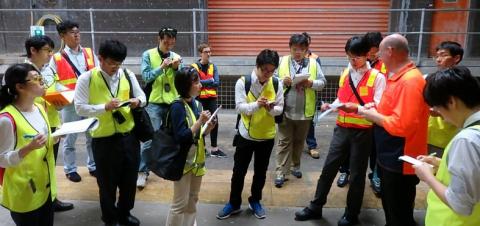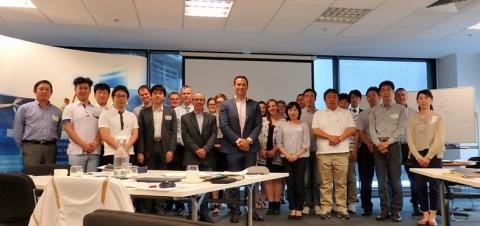WSAA is in the business of sharing and collaboration. So it wasn’t too much of a stretch to say ‘yes’ when the Japan Water Works Association (JWWA) asked WSAA to host a delegation of Japanese water utility executives.
What did they learn?

The trip kicked off in typical Aussie style, with Adam Lovell our Executive Director welcoming our Japanese colleagues at a noisy and cheerful Thai restaurant, before getting down to the serious stuff: showcasing a range of interesting programs and case studies from the Australian urban water industry. Members of the WSAA team started each day with overviews of institutional arrangements and regulation, customers, climate change, asset management and research and innovation. These presentations were supported by case studies from our members and site visits.
Kris Funston joined us from Sydney Water to delve into regulation and pricing. Nicola Nelson, also from Sydney Water, and Smart Approved WaterMark’s Chris Philpot took the group through Australia’s changing climate, climate change adaptation and water efficiency in Australia. A visit to Flow System’s water management centre at Central Park highlighted changes in regulation, competition and an example of ‘green’ infrastructure.
In Melbourne the delegates focused on asset management, a topic they were very excited about, speaking with WSAA’s Greg Ryan, Coliban Water’s Neville Pearce and Andrew Chapman from South East Water. A visit to Melbourne Water’s Winneke Treatment Plant and Glenroy Drainage Improvement Project got the group out of the office and into the field – it was over 35 degrees that day!
Back in the office on the final day, the group focused on research and innovation with WSAA staff Lisa Ehrenfried and Gayathri Ramachandran. They spoke about WRAP, our online platform to access Australian water research and the research landscape in Australia. Lisa and Gayathri were joined by Nada Abubakr from Isle Utilities to talk TAG and Jamie Ewert, CRC for Water Sensitive Cities shared opportunities for using stormwater as a resource.
What did we learn?

Not surprisingly, there are some BIG differences between Japan and Australia, and our water industries. We’re dealing with very different issues around population growth, natural disasters and climate. The delegates were keen to share their challenges such as a declining and aging population, managing natural disasters and extreme weather events such as earthquakes and floods, and educating customers on the importance of water, even when you have a lot of it.
There are plenty of similarities too, and in particular we’re asking the same questions – how do we deal with the effects of climate change and extreme weather events? How do we become more efficient? How can we better communicate with our customers? While neither country has all the answers, asking these questions of each other, and sharing our insights furthers our knowledge and strengthens our businesses and industry.
These experiences are not only positive experiences for our international visitors, but they are also rewarding for the WSAA team and our members. While we foster a number of international relationships at WSAA, our focus has generally been directed towards the US, UK and New Zealand. Building stronger relationships with our neighbours in the Asia Pacific can be great opportunity for all involved. Our relationship with Japan and JWWA in particular, a leading industry and organisation in Asia, can result in a greater understanding between Australia and nations throughout the wider region. By sharing we strengthen all our businesses.
A note from Takayuki Sawai, JWWA’s Deputy Director, International
We really appreciate WSAA's preparation and cooperation in our new international training initiative for Japanese utility staff. The delegates were really excited to learn about the Australian urban water industry, which has a different structure and culture, and is faced with different issues around climate and other situations. We found the most valuable aspects to be:
- An opportunity to consider and evaluate our situation in Japan and what we are doing.
- Comparing the measures that are taken to solve or mitigate difficult problems in both countries.
- Gaining knowledge, not only on new or advanced issues but also comprehensive water business and solutions.
- Speaking and listening to REAL English
- Strengthening the relationship between associations and countries.
